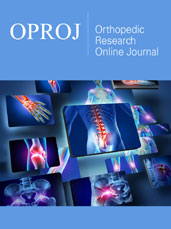- Submissions

Full Text
Orthopedic Research Online Journal
Two-Faced Diarrhoea in a Young Adult with Juvenile Idiopathic Arthritis: Clostridioides Difficile Infection And Crohn’s Disease
Manuel Sette1, Matteo Ferrito1 and Achille Marino2*
1University of Milan, Italy
2Unit of Pediatric Rheumatology, ASST Gaetano Pini-CTO, Italy
*Corresponding author: Achille Marino, Unit of Pediatric Rheumatology, ASST Gaetano Pini-CTO, Italy
Submission: September 01, 2022;Published: Septmeber 08, 2022

ISSN: 2576-8875 Volume10 Issue1
Abstract
We herein report a case of a 24-year-old male affected with juvenile idiopathic arthritis (JIA) with an unusual case of community-acquired Clostridioides difficile-Associated Diarrhoea (CDAD) and Crohn Disease (CD). The concomitant presence of a chronic, autoimmune, inflammatory arthropathy, an inflammatory bowel disease and an opportunistic infection is unusual. Their simultaneous presence in a patient on treatment with Disease-Modifying Anti-Rheumatic Drugs (DMARDs) should prompt rheumatologists to consider autoimmune as well as infective causes when assessing a patients lamenting gastrointestinal manifestations such as diarrhoea.
MeSH Indexing Terms
“Arthritis, Juvenile”
“Clostridioides difficile”
“Crohn Disease”
Opinion
Juvenile Idiopathic Arthritis (JIA) is an umbrella term gathering all chronic arthritides starting in childhood with an unknown cause. JIA patients, especially those exposed to immunosuppressants, are more prone to developing community-acquired infections and opportunistic infections [1,2]. Furthermore, the possible coexistence between JIA and other autoimmune conditions is not surprising, and it has been reported to increase the risk of disability and mortality in these patients [3,4]. Herein we report a peculiar case of community-acquired Clostridioides Difficile-Associated Diarrhea (CDAD) and concomitant Crohn’s Disease (CD) that occurred in a patient with JIA on methotrexate (MTX)
The patient was a Caucasian, 24-year-old male diagnosed with oligoarticular JIA at the age of 12, who was in persistent remission with MTX 20mg weekly. He was admitted for a 1-month history of periumbilical crampy pain with non-bloody mucous diarrhea and a self-reported weight loss of 7kg in the past month, with no other systemic symptoms. His mother and brother were both affected by CD.
Two months before, he had pharyngitis, for which he had taken oral cefixime 400mg daily for seven days. Upon admission, reverse-transcription polymerase chain reaction (RT-PCR) test on a nasopharyngeal swab for SARS-CoV-2 was negative, and routine laboratory tests were normal except for a mildly elevated C-reactive protein (CRP 2.1mg/dL; n.v. <0.5) and neutrophilia in the setting of a normal white cell count (WBC 4.8 x 1000/L, with 72% neutrophils). A stool sample culture test was negative for Salmonella, Shigella, and Campylobacter jejuni, but it yielded C. difficile antigen as well as A and B toxins. Thus, a diagnosis of CDAD was made and therapy with oral metronidazole 500mg three times a day was started.
After ten days, despite some improvement, diarrhea persisted. Therefore, the patient underwent further work-up (bowel ultrasound, colonoscopy, and biopsy), leading to a CD diagnosis with predominant ileocecal valve involvement. Oral budesonide was started followed by mesalazine with a good initial response. After eight months, the patient withdrew MTX due to intolerance, and Adalimumab was added. Over the subsequent six months, he did not complain of gastrointestinal problems, and his arthritis was under control.
Patients with JIA are usually treated with immunosuppressants such as MTX, which make them more susceptible to infections and recurrent antibiotic use. Immunosuppression and the frequent usage of antibiotics are two risk factors for CDAD. Furthermore, the increased risk of other autoimmune diseases in patients with JIA is well known [3,4], as is the higher risk of CDAD in patients with CD [5]. Being their concurrence unusual, this case highlights how JIA patients on immunosuppressants who complain of gastrointestinal manifestations should be thoroughly evaluated for infective and autoimmune causes.
References
- Giancane G, Swart JF, Castagnola E, Groll AH, Horneff G, et al. (2020) Opportunistic infections in immunosuppressed patients with juvenile idiopathic arthritis: Analysis by the Pharmachild Safety Adjudication Committee. Arthritis Res Ther 22(1): 1-15.
- Winthrop KL, Novosad SA, Baddley JW, Calabrese L, Chiller T, et al. (2015) Opportunistic infections and biologic therapies in immune-mediated inflammatory diseases: Consensus recommendations for infection reporting during clinical trials and postmarketing surveillance. Ann Rheum Dis 74(12): 2107-2116.
- Simon TA, Harikrishnan GP, Kawabata H, Singhal S, Brunner HI, et al. (2020) Prevalence of co-existing autoimmune disease in juvenile idiopathic arthritis: A cross-sectional study. Pediatr Rheumatol 18(1): 1-12.
- Goodhand J, Dawson R, Hefferon M, Tshuma N, Swanson G, et al. (2010) Inflammatory bowel disease in young people: The case for transitional clinics. Inflamm Bowel Dis 16(6): 947-952.
- Balram B, Battat R, Al-Khoury A, D’Aoust J, Afif W, et al. (2019) Risk factors associated with clostridium difficile infection in inflammatory bowel disease: A systematic review and meta-analysis. J Crohn’s Colitis 13(1): 27-38.
© 2022 Achille Marino. This is an open access article distributed under the terms of the Creative Commons Attribution License , which permits unrestricted use, distribution, and build upon your work non-commercially.
 a Creative Commons Attribution 4.0 International License. Based on a work at www.crimsonpublishers.com.
Best viewed in
a Creative Commons Attribution 4.0 International License. Based on a work at www.crimsonpublishers.com.
Best viewed in 







.jpg)






























 Editorial Board Registrations
Editorial Board Registrations Submit your Article
Submit your Article Refer a Friend
Refer a Friend Advertise With Us
Advertise With Us
.jpg)






.jpg)














.bmp)
.jpg)
.png)
.jpg)










.jpg)






.png)

.png)



.png)






